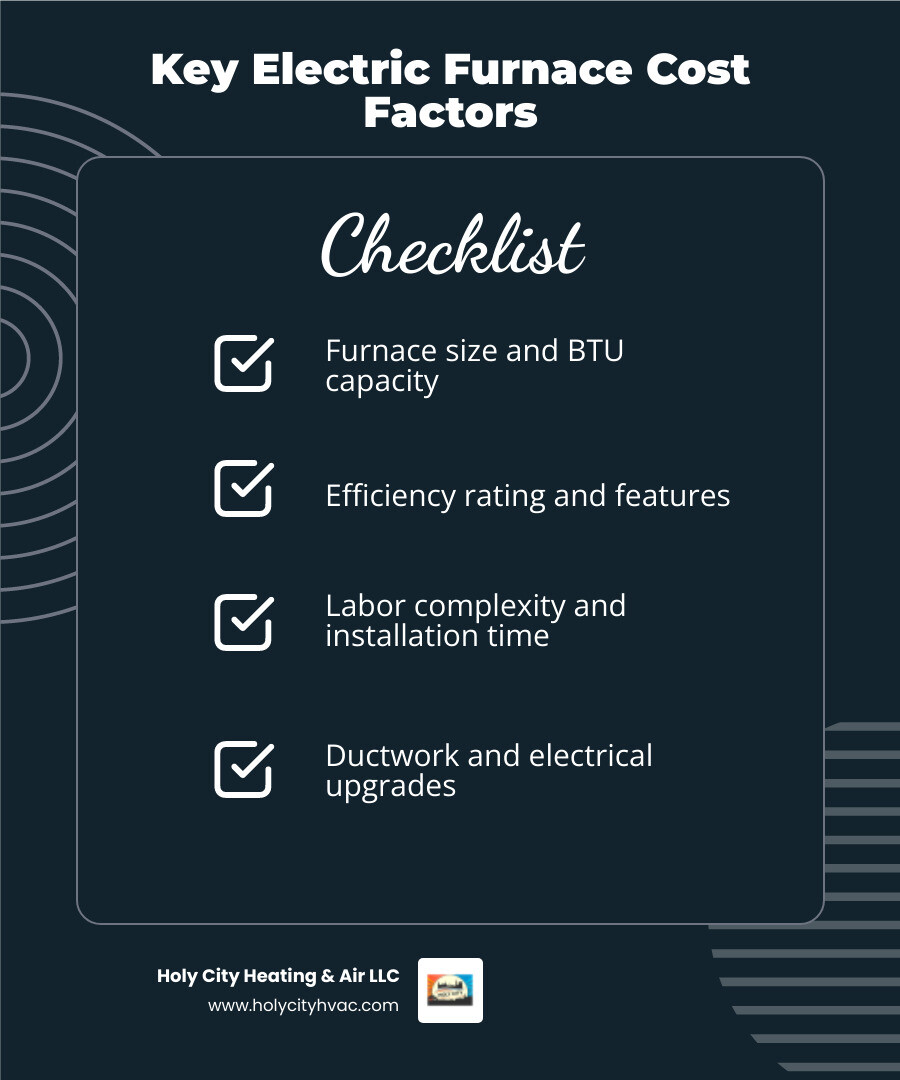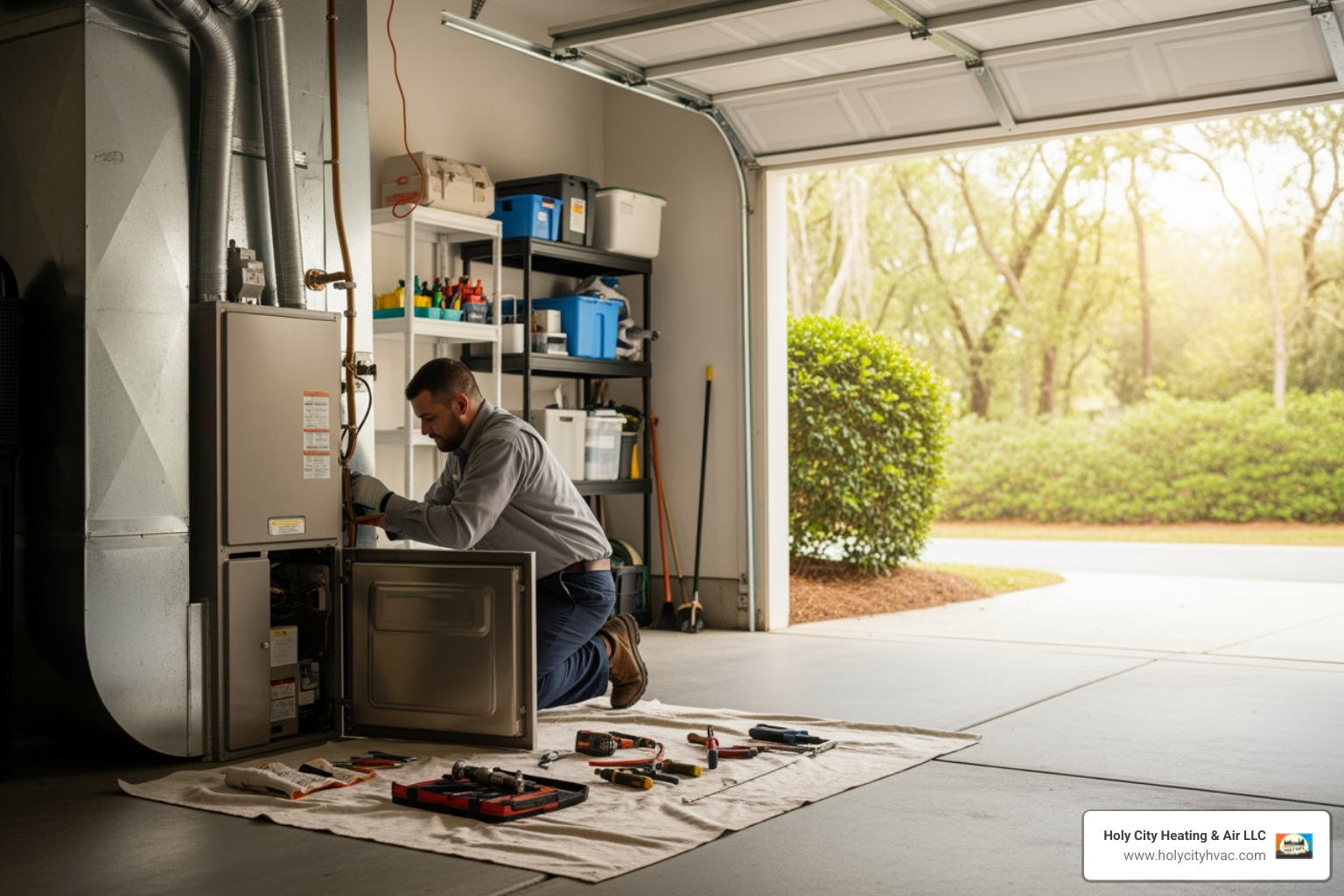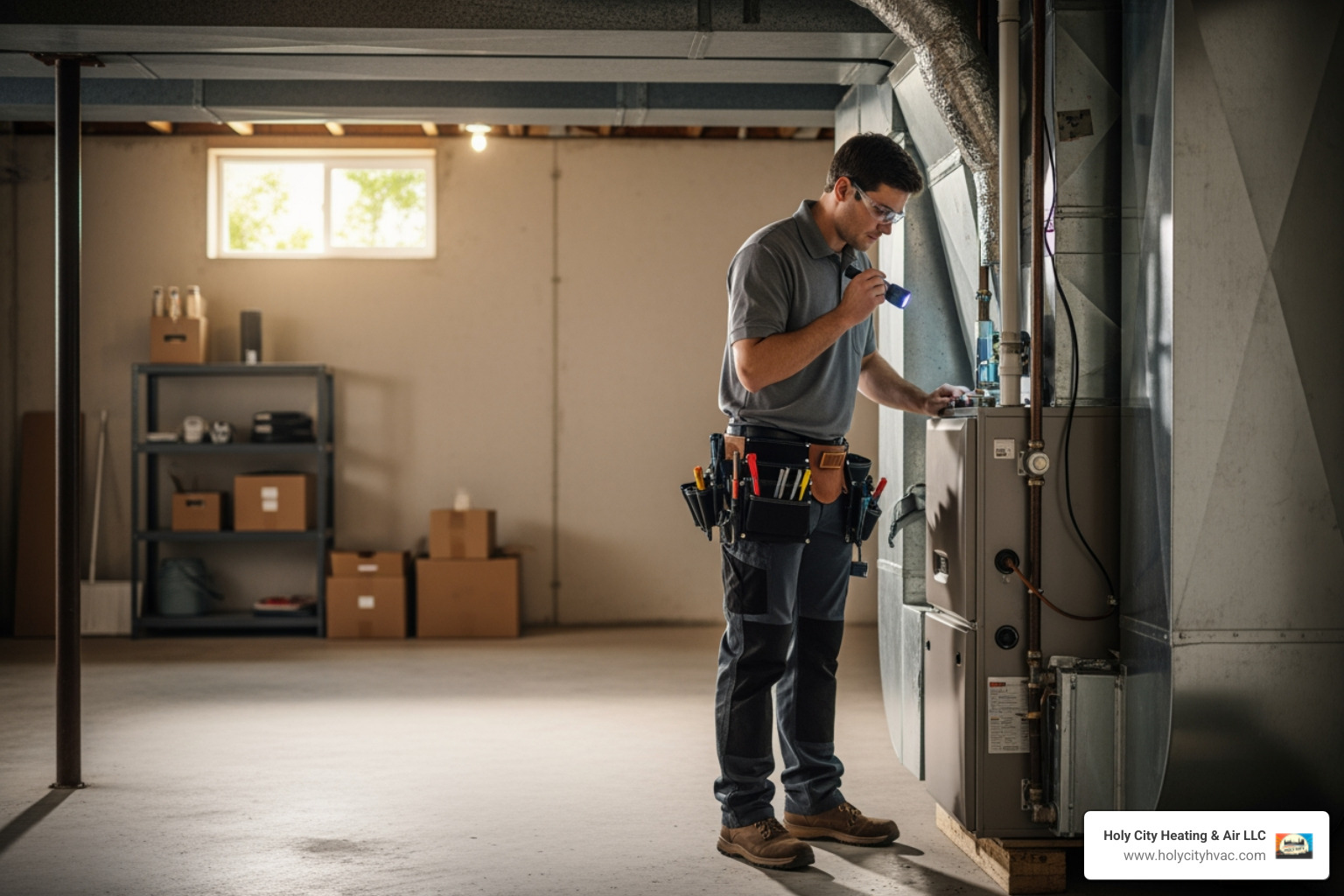
Why Understanding Electric Furnace Replacement Matters for Charleston Homeowners
If you're a Charleston homeowner considering an electric furnace replacement, you know it's a significant home improvement decision—one that affects your comfort and energy use for years. Unlike minor repairs, a furnace replacement is a long-term investment in your home's heating system.
The scope of the project depends on much more than just the unit itself. Key factors include:
- Furnace size and BTU capacity
- Efficiency rating and features
- Labor complexity and installation time
- Ductwork condition and modifications
- Electrical system upgrades
Electric furnaces offer unique advantages for Charleston homes. Their installation can be more straightforward than gas systems since they don't require gas lines or venting. With proper maintenance, they can last 20 to 30 years—about five years longer than gas furnaces. While their energy usage can be higher, this is balanced by their longevity and reliability.
Professional installation is essential. Electric furnaces involve high-voltage electrical work that must meet local building codes. Improper installation can create safety hazards, void your warranty, and lead to inefficient operation and higher energy bills.

Understanding the Scope of an Electric Furnace Replacement
When you research an electric furnace replacement, you'll find that every project is unique. The total scope depends on two main components: the furnace unit itself and the labor required for a proper installation.
Every home is different. A straightforward replacement of an old electric furnace with a new one is a much simpler project than a brand-new installation or a conversion from a gas or oil system. Two factors significantly impact the project's complexity: your existing ductwork and your home's electrical system. If your ductwork is in good shape and your electrical panel can handle the load, the project is more direct. However, if duct repairs, new ductwork, or electrical upgrades are needed, these additions will expand the scope of the work.

What to Expect for a Standard Replacement
If you're simply replacing an existing electric furnace with a similar model, you're looking at the most straightforward scenario. Your home already has the necessary infrastructure: functioning ductwork to distribute air and correctly sized electrical wiring.
This allows our technicians to focus on a "unit swap-out." We'll remove your old furnace, position the new one, and connect it to your existing systems. Because we aren't making major modifications, the labor time is typically shorter, making this the most direct type of electric furnace replacement project.
The Scope of a New Installation or System Conversion
If you're installing an electric furnace for the first time or converting from a gas or oil system, the project is more involved. These situations require significantly more work and planning.
New construction or first-time installations mean starting from scratch. We must design and install a complete ductwork system to carry heated air throughout your home. This involves careful planning to ensure proper airflow to every room.
Fuel type conversions present unique challenges. When switching from gas or oil, your home's electrical system likely needs an upgrade to handle the power demands of an electric furnace. This often involves upgrading your electrical panel and running new, heavier-gauge wiring for safety and code compliance.
Both scenarios require more labor, and you'll also need to factor in permit fees required by local authorities to ensure all work meets Charleston's building and safety codes. While these projects are more complex, they are an investment in your home's long-term comfort and value. Once the infrastructure is in place, future replacements become simpler.
Key Factors That Influence Your Furnace Replacement Project
When planning for a new electric furnace, understanding what drives the project's scope helps you make smart decisions. The size of your home, the efficiency features you choose, the complexity of the installation, and any necessary system upgrades all contribute to the final project.

Furnace Size and Capacity (BTU)
The heating capacity of your furnace—measured in British Thermal Units (BTUs)—plays a major role in your project. A key factor affecting electric furnace selection is its size. A furnace with a higher BTU rating can heat a larger space and is a more significant piece of equipment. If you’d like a quick primer on BTUs, the U.S. Energy Information Administration offers a helpful overview: What is a British Thermal Unit (BTU)?
Choosing the right size isn't about picking the biggest unit. We consider your home's square footage, Charleston's mild climate, insulation quality, ceiling height, and window placement. An undersized furnace runs constantly, while an oversized one heats too quickly and shuts off, creating temperature swings. That's why we perform a Manual J load calculation, an industry-standard assessment that ensures your furnace is perfectly matched to your home's heating needs.
Unit Efficiency, Features, and Brand
While electric furnaces are highly efficient at converting electricity to heat (achieving a nearly 100% AFUE rating), the supporting features can impact comfort and energy use.
Variable-speed blowers are a valuable upgrade. They adjust airflow to match heating needs, resulting in more consistent temperatures, quieter operation, and better energy management. Single-stage blowers are simpler, while two-stage options offer a middle ground.
The brand you choose also matters. Established brands invest in quality materials, rigorous testing, and comprehensive warranty coverage. At Holy City Heating & Air, we work with trusted brands like Daikin, whose reliability gives our customers peace of mind. A reputable brand often means better performance over the life of your system.
Labor and Installation Complexity
Professional labor is a crucial part of your replacement project. Our technicians' expertise ensures your system operates safely and efficiently from day one.
Installation time varies. A straightforward replacement in an accessible location takes less time than a complex installation in a cramped attic or crawl space. Modifications to fit the new unit or safe old furnace removal and disposal can also affect the timeline.
Additional System Requirements
Your furnace is part of a larger system. Getting optimal performance often means addressing other components.
Your home's ductwork is critical. Leaky or damaged ducts prevent even the best furnace from performing well. Ductwork repair or duct sealing can make a significant difference. In some cases, new ductwork installation is necessary for efficient heating.
Electrical circuit upgrades are common in older Charleston homes. Electric furnaces require substantial power, and your panel must have the capacity to handle the load safely. An electrician may need to install new wiring or upgrade your panel.
Finally, upgrading to a smart thermostat can optimize your heating schedule, reduce energy consumption, and allow remote access for greater control and comfort. Consider looking for ENERGY STAR certified smart thermostats to help improve overall system performance.
When to Replace Your Electric Furnace
Knowing when to replace your electric furnace isn't always about a dramatic breakdown. Often, it's the quieter signs that your system is no longer performing efficiently. Understanding these indicators helps you make a smart decision for your Charleston home.

Typical Lifespan and Telltale Warning Signs
With proper maintenance, electric furnaces can last 20 to 30 years—longer than most gas furnaces. But even reliable systems show their age. Recognizing the warning signs can help you plan a replacement on your terms.
- Frequent repairs: If you're constantly calling for service, it may be time to consider a replacement instead of another repair.
- Rising energy bills: If your heating costs climb without a change in usage or utility rates, your aging furnace is likely working harder and less efficiently.
- Uneven heating: Hot and cold spots throughout your home suggest your furnace is struggling to distribute heat effectively.
- Strange noises: Clanking, banging, or groaning sounds often indicate that internal components are wearing out.
- Visible rust or corrosion: Physical deterioration is a clear sign that the unit is nearing the end of its life.
Long-Term Performance and Energy Use
While electric furnaces often have a more straightforward installation than gas systems, it's important to consider their long-term energy consumption. Electric furnaces use electricity to generate heat, and your monthly energy use depends on your home's efficiency and local utility rates.
The concept of total cost of ownership considers both the initial project and your energy consumption over the furnace's lifespan. An older, inefficient electric furnace may seem fine, but if it's consuming excess electricity, you're wasting energy and money. A new, high-efficiency system can provide significant energy savings over its lifetime, offering better long-term value. It's a balance between the initial investment and the ongoing performance.
Rebates, Incentives, and Financing Options
A new electric furnace replacement is a significant home improvement. Fortunately, several programs can help make this upgrade more manageable.
Federal tax credits and utility company rebates are often available for homeowners who install qualifying energy-efficient HVAC systems. These programs are designed to encourage energy conservation. Manufacturer promotions can also provide savings, while financing options allow you to spread the investment over time with manageable monthly payments. We can help you identify which programs may apply to your project.
Frequently Asked Questions about Electric Furnaces
We hear the same questions from Charleston homeowners all the time. Understanding how electric furnaces compare to other options, why professional installation is critical, and what "efficiency" really means can help you make the best decision.
How does an electric furnace compare to a gas furnace?
When weighing heating options, it's helpful to compare electric and gas furnaces.
- Installation: An electric furnace installation is typically more straightforward. They don't need gas lines or flue venting, which can simplify the process.
- Operating Energy: In many areas, natural gas is a less expensive energy source than electricity. This means a gas furnace may have lower monthly energy usage costs, though Charleston's mild winters can narrow that gap.
- Safety: Electric furnaces have a safety advantage. With no combustion, there is no risk of carbon monoxide leaks or gas line issues.
- Maintenance: Electric furnaces generally require simpler maintenance, as they have fewer mechanical components related to combustion.
- Environmental Impact: The environmental footprint of an electric furnace depends on how your electricity is generated. If it comes from renewable sources, it can be a very green option.
Why is professional installation for an electric furnace necessary?
While it might be tempting to handle installation yourself, electric furnaces involve high-voltage electrical work that is dangerous without proper training.
Safety hazards are a primary concern. These units operate on 240-volt circuits, and a wiring mistake can lead to fires or severe shocks. Our licensed technicians are trained to handle these systems safely. Furthermore, local building codes in Charleston have specific requirements for furnace installations to protect your home and family.
Many homeowners don't realize that most manufacturers will void your warranty if the unit isn't installed by a certified professional. A DIY installation could leave you paying for future repairs that should have been covered. Finally, proper sizing requires a professional load calculation to ensure your furnace operates efficiently and keeps your home comfortable. Homeowners can also verify technician credentials through NATE’s technician ID lookup for added peace of mind.
Are electric furnaces considered energy efficient?
At the point where electricity becomes heat, electric furnaces are incredibly efficient, with a 100% AFUE rating. This means virtually all the electricity the furnace uses is converted into heat for your home, with no waste through a chimney or flue.
However, your home's overall heating efficiency involves more than just the furnace. Even with a 100% efficient furnace, heat can be lost through leaky ductwork or poor home insulation. Warm air can escape into your attic or walls instead of reaching your rooms.
This is why we emphasize the importance of good home insulation and well-maintained ductwork. The overall system efficiency—how well your entire home retains heat—matters just as much as the furnace's rating. We look at the whole picture to ensure you get the most comfort and value from your heating system.
Your Trusted Partner for Furnace Replacement
Making a decision about your electric furnace replacement doesn't have to be overwhelming. With the right information and a trusted partner, you can move forward confidently, knowing your Charleston home will be comfortable for years to come.
We've walked through the key factors that shape your project—from choosing the right size and efficiency to understanding how labor and system upgrades play a role. We've also covered the signs that it's time for a replacement and the importance of professional installation for your safety and peace of mind. An informed decision starts with understanding all the pieces that fit together to create a reliable heating system.
At Holy City Heating & Air LLC, we're more than just HVAC technicians. We're a family-owned company serving Charleston and the surrounding areas since 2015, backed by over 20 years of industry expertise. Our EPA-certified, licensed professionals believe in transparent communication—no confusing jargon, just honest guidance to help you make the best choice for your home.
When you're ready to discuss your furnace replacement, we'll start with a thorough assessment of your home's unique needs, including a proper load calculation and an evaluation of your existing systems. Our goal is to deliver lasting comfort and value that you can count on.
Learn more about our professional heating services and find how we can bring reliable warmth and comfort to your home.
Recent posts


















